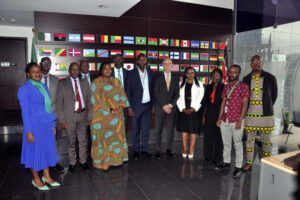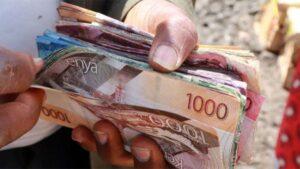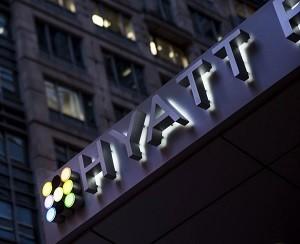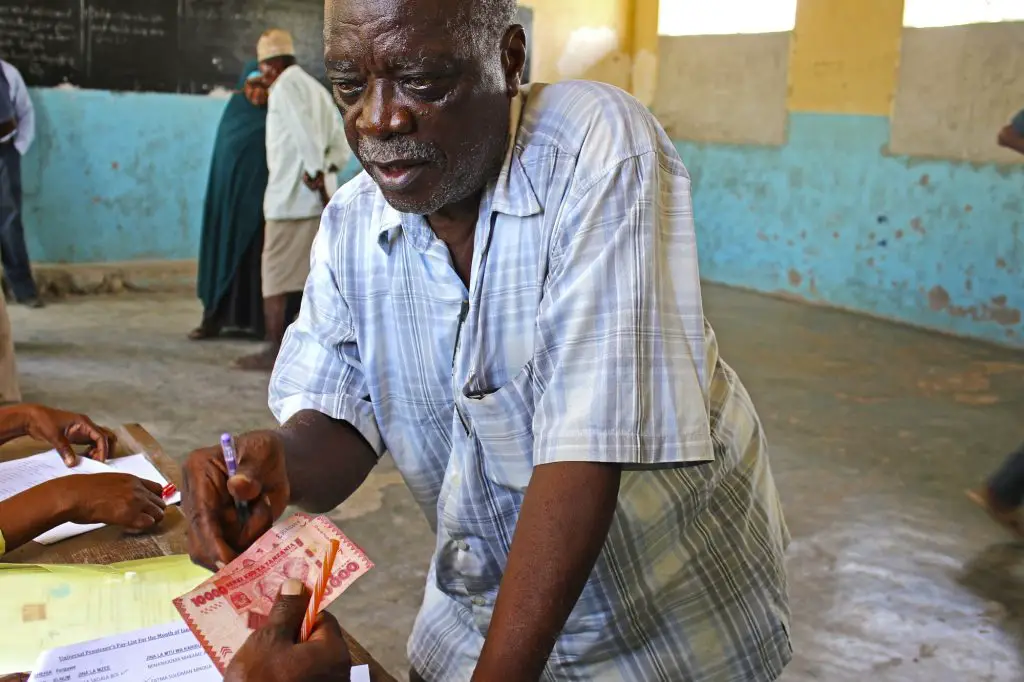- Kenyan Farmers Receive $2M Boost from Africa Fertiliser Financing Mechanism
- Brace for High Interest Rates for a Longer Period World Bank Warns Kenya
- Kenya-Ethiopia Trade Relations: Legislators Advocate for Policy Alignment to Boost Ties
- Visualising the state of debt in Africa 2024
- Abu Dhabi radiates optimism as over 300 startups join AIM Congress 2024
- TLcom Capital Raises $154 million in Funding to Boost Its African Growth
- Africa’s $824Bn debt, resource-backed opaque loans slowing growth — AfDB
- LB Investment brings $1.2 trillion portfolio display to AIM Congress spotlight
Browsing: Coronavirus
After slow production during the Covid-19 lock down, Zimbabwe’s gold sector has had a drastic come back reporting gold revenue is up almost 50 percent at least one of its major mines.
The total revenue recorded for the second quarter of 2020 clocked and impressive to USD23. 6 million, that is almost double (48 percent) the revenue brought in during the same period last year.
Having topped last year’s production by USD15. 9 million, Blanket Gold Mine that is based in the Gwanda region, increased production all through the first quarter this despite glitches caused by the Covid-19 pandemic.
The mine is owned by the Caledonia Mining Corporation and was proud to announce it had produced 14,233 ounces of gold in the second quarter up from the 11,948 produced during the same period last year.
The production level is very impressive given the fact that other miners could not access …
The job market is ever dynamic; continuously changing as a result of socio-economic and technological development. In recent months however, the changes experienced are neither as a result of economic nor technological advancement, but rather, the health crisis that has altered the daily lives of people around the world.
One of the major effects of COVID-19 on the labour market is the loss of jobs for hundreds of millions of people. In big economies, workers are benefiting from unemployment claims, but the same cannot be seen in developing countries in Africa where governments are grappling with means to mitigate the effects of the current pandemic.
Predictions from the UN’s International Labour Organization (ILO) show that up to “1.6 billion workers in the informal economy – that is nearly half of the global workforce – stand in immediate danger of having their livelihoods destroyed.”
According to the ILO Monitor …
As countries across the globe start to lift lock-downs and relax restrictions, there is the natural human impulse to do something to celebrate freedom, survival, hope and a future. Be careful!! As wealth managers many of our clients have asked us how best they can stay safe financially as the world threatens to return to a new normal…..
Firstly, my own opinion is that medically things are going to get a whole lot worse before they get better. Government management of the pandemic has been very, very poor nearly everywhere and I expect a large second wave of infections in UK, US and across much of Europe. In Uganda we are only now seeing the first spike and there may be more restrictions ahead. We are certainly NOT home and dry in terms of the pandemic itself.
Also Read: Coronavirus update: E. Africa postpones Heads of State meeting
What …
President Obama’s chief of staff, Rahm Emanuel once said “you never want a serious crisis to go to waste. It provides the opportunity to do things that were not possible to do before”.[1] When the COVID-19 crisis hit the global north the fear was that it would be most devastating in Africa with Bill Gates predicting that ten million lives would be wiped out by the virus.[2] But he was wrong because African leaders did what was not possible before – they locked down their countries and instituted adherence to the protocols of social distancing and washing of hands. These preventive measures and the sudden change of behavior slowed down the virus’s serious impact in Africa. According to Harvard Health preventing the spread of the virus is rooted in behavioral change.[3] Starting up new behavior in the new normal was what the US and Europe could not …
As hotels in East Africa are closing their doors as the effects of the global pandemic continue to bite, Tanzania is making moves to ward off the negative effects of Covid-19 by resuming business as usual, including in its tourism and hospitality sector.
In fact only this past week, Tanzania has announced that it will host its first Mafia Island Tourism Exhibition Week. The ambitious and bold move is in line with other measures that the country is taking to revive its tourism sector.
The country has already set aside millions of dollars to improve tourists experience at one of its major attractions, Mt Kilimanjaro. Tanzania has set aside money to cut out a new route to climb the mountain. This new route is exclusive for VIP tourists and other VIP personnel and is expect to boost tourism in the region.
Also Read: Tanzania’s Tourism Board unveils luxury route to
…Tanzania relays heavily on the tourism sector for its foreign exchange earnings and to save this vital sector, the country has announced plans to have all hotels and other tourist facilities across the country bear Covid-19 certificates that basically declare the facility a Covid-19 free area.
According to the Bank of Tanzania (BoT) the tourism sector is Tanzania’s top foreign exchange earner clocking USD 2.44 billion last year. It only makes sense that the country would do all in its power to save the sector in the wake of the pandemic.
The move, to have tourism facilities display Covid-19 free zone poster is expected to build the trust of tourists and allow them to regain confidence in the hotels or related facility.
The said ‘posters’ will be the kind that health officers place in the windows of restaurants abroad with the grade of the said hotel in full display. The …
For over two months now, companies in Tanzania are holding back contractors and supplier payments blaming it on a lack of funds due to the global coronavirus crisis.
Chinese companies are particularly in the spotlight with suppliers complaining of delayed payments for goods delivered and services done. In an exclusive with this paper, an aggregate mine operator (name withheld) said payments due to the company from Chinese companies are still pending two months down the road.
This is the exact scenario that the government tried to evade when it throughout the Central Bank, Bank of Tanzania, it released a stimulus package to cushion the economy to ensure business stay liquid and are able to make all due payments.
It is not far fetched to think companies are taking advantage of the ongoing health crisis not to pay their debts or even government taxes and fees. I mean, non performing loans …
When something grows by 50 percent, we say it has doubled, when it grows by 100 percent, it has quadrupled and so on and so forth. You want to know by how much telecommunication companies in Rwanda have grown during the onslaught of the coronavirus? I will tell you, an amazing 450 percent.
According to the Rwanda Utilities Regulation Authority, between January and April alone, telecom companies in Rwanda have amassed over USD 42 million that is an average of USD 10 million a month.
This impressive performance is representative of a drastic paradigm shift, the migration from a pre-dominantly cash based society to one that has gone almost absolutely cashless. Rwanda has in the fight against the spread of coronavirus gone cashless, switching from use of cash payments to digital platforms via mobile money transfers.
Last month, The Exchange published an article titled Digital Africa in which it was …
By Ms. Carole Agengo, Dr. Ademola Olajide and Dr. Mohamed A. Sheikh
The writers are the Africa Regional Director for HelpAge International; UNFPA Representative, Kenya; and Director General for National Council for Population and Development (NCPD)
Africa is often referred to as the ‘world’s youngest continent.’ This is certainly true when one compares the median age of Africans, currently 19 years, while Europe’s median age is 43 years and Asia’s 32. This reflects the relatively small proportion of older adults – those aged 60 years and above, in the total population. Africa occupies the unique position of being, concurrently, the demographically youngest continent and the world region with the most rapidly growing number of older people.
The onslaught of the COVID-19 pandemic with its disproportionate impact on older persons, has heightened the urgency of social protection for the population of older persons.
In Kenya, President Uhuru Kenyatta and the Ministry …
By Dr. Olajide Ademola (UNFPA) and Dr. Benjamin Djoudalbaye (Africa CDC)
The COVID -19 pandemic has drastically challenged and strained health systems worldwide. All components of the health delivery architecture – from human resources to physical infrastructure – have been severely tested as morbidity and mortality caseloads, unfortunately, gallop. Globally, over four million people have been infected, with about 282 244 lives lost and over one million recoveries between December 2019 and May 2020. As the pandemic continues to evolve and the numbers trickle in, we are not just learning about the fatalities and survival, but also about redefining our healthcare systems.
Western societies are experiencing the heaviest of the unprecedented effects yet they host advanced health care amenities and have established economies. A report released early March called on leaders in Africa to prepare for worse but on the contrary, the continent appears to be gradually reaping benefits of …












